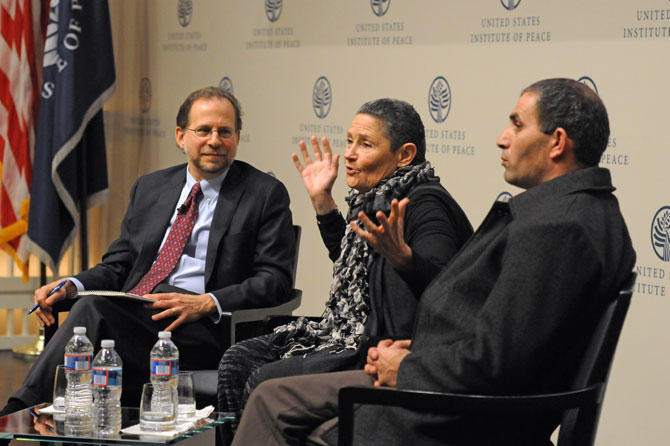Facilitated Dialogue in the Arab-Israeli Conflict
Read the Event Coverage"Two Sided Story," a USIP grant-supported documentary film, documents what transpires when hardline Israeli settlers meet Palestinian activists resisting the Israeli occupation, and when Israeli soldiers meet Palestinians who have served time in Israeli jails. Ben Mayor then accompanies the participants back home when they return to their families and grapple with a complex daily reality. Please join us for a screening of the film and a discussion with two active participants in the dialogue process.

In "Two Sided Story," a documentary funded in part by a USIP grant, Emmy award-winning director, Tor Ben Mayor, follows a group of Israelis and Palestinians from different generations, backgrounds, and political persuasions as they meet, dialogue, and get to know each other as human beings. These 27 Israelis and Palestinians met under the framework of a project led by Parents Circle Families Forum – Bereaved Palestinians and Israelis for Peace and Reconciliation. In this Israeli and Palestinian co-production, Ben Mayor documents what transpires when hardline Israeli settlers meet Palestinian activists resisting the Israeli occupation, and when Israeli soldiers meet Palestinians who have served time in Israeli jails. Ben Mayor then accompanies the participants back home when they return to their families and grapple with a complex daily reality.
On February 7, 2013, USIP hosted a screening of the film, which was followed by a discussion with Bassam Aramin and Robi Damelin, two active members of PCFF - Bereaved Palestinians and Israelis for Peace and Reconciliation, and moderated by USIP's Steve Riskin.
Click here to view the "Two Sided Story" trailer.
Bassam Aramin became involved in the Palestinian struggle as a boy growing up in the ancient city of Hebron. At 17, he was caught planning an attack on Israeli troops, and spent seven years in prison. In 2005, he co-founded Combatants for Peace, an organization of former Israeli and Palestinian combatants leading a non-violent struggle against the occupation. Since then, Bassam has never picked up a weapon – not even when, two years later, his ten-year-old daughter Abir was gunned down and killed. Bassam works in public relations at the Palestine National Archives in Ramallah for the Palestinian Authority.
Robi Damelin was born in South Africa and immigrated to Israel in 1967 as a kibbutz volunteer. She lost her son David in March, 2002, when a Palestinian sniper shot him. David was a student at Tel Aviv University studying for his MA in philosophy of education. He was an active member of the peace movement. In South Africa, Robi was very active in anti-apartheid activities. In Israel she owned a public relations firm with clients such as National Geographic, the History Channel, and Unilever. After the loss of her son she closed her office in order to devote her time to work with the Parents Circle Families Forum to promote reconciliation.



